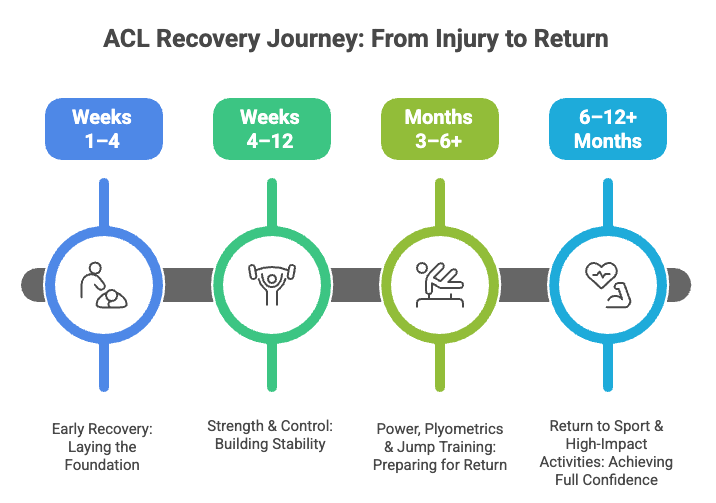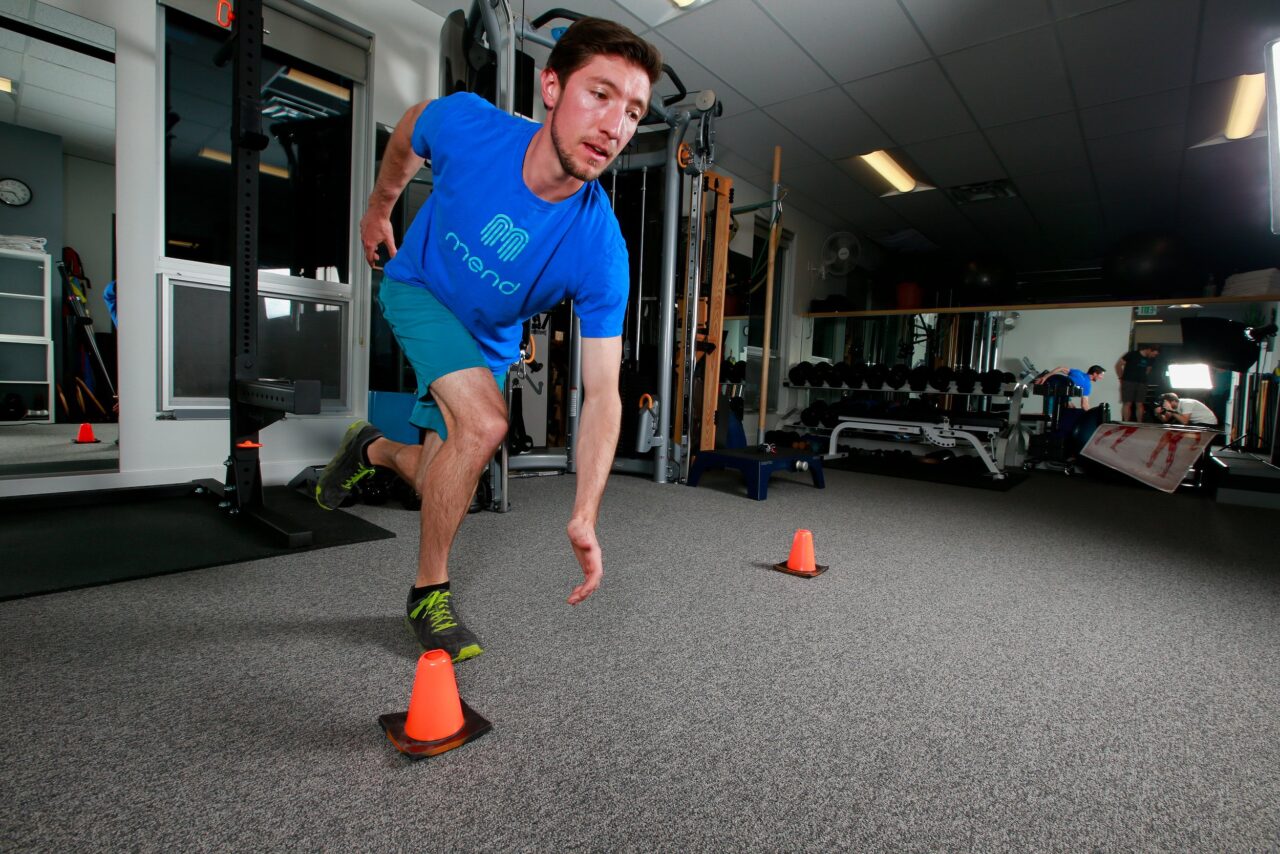Jumping after ACL surgery is a major milestone and at Mend Colorado, we know how important it is for you to return safely and confidently to your favorite activities. Serving Boulder, Lafayette, and the greater Colorado community, our team uses the latest research and a truly personalized approach to guide your recovery every step of the way.
Here, we’ll break down when it’s safe to start jumping again after ACL surgery and explain how Mend Colorado helps you get there safely and confidently.
Ready to accelerate your recovery?
Schedule your personalized ACL consultation with Mend Colorado in Boulder or Lafayette today.
Book Your Consultation Now | Call: (720) 772-6780
Understanding ACL Tear Recovery Time: Setting Realistic Expectations
An ACL (anterior cruciate ligament) tear is a significant knee injury, often affecting athletes and active individuals who love activities like hiking, skiing, and mountain biking right here in Boulder, Lafayette, and across Colorado. Recovery after an ACL tear is complex because it’s not just about healing the ligament. It’s about restoring strength, stability, and confidence in your knee so you can safely return to dynamic movements like jumping.
Typical ACL tear recovery time ranges from 6 to 12 months, but every journey is unique. At Mend Colorado, we emphasize that your progress should be guided by objective criteria like strength, movement quality, and readiness tests, not just the calendar. Rushing back too soon can increase the risk of re-injury and slow your overall recovery.
Our tailored approach means we consider your goals whether it’s getting back to the slopes, trails, or courts and create a plan that fits your lifestyle and needs.

The Science of Safe Return: Why Jumping After ACL Surgery Is a Milestone
Jumping is one of the most demanding activities you can ask of your knee after ACL surgery. It requires explosive strength, precise coordination, and full confidence in your movement whether you’re landing a box jump at CrossFit, catching air on a mountain bike trail, or powering through moguls on a Colorado ski slope. That’s why returning to jumping is considered a major milestone in ACL recovery.
At Mend Colorado, we follow a criteria-based progression rather than a fixed timeline. You’ll advance only when objective benchmarks show you’re ready, ensuring a recovery that’s evidence-driven.
Your journey is unique. We’re here to guide you every step of the way, making sure you’re truly ready for each new challenge.
Why Athletes Trust Mend Colorado for ACL Recovery in Boulder & Lafayette
Athletes across Boulder, Lafayette, and beyond choose Mend Colorado because we combine science-backed rehab with local expertise and one-on-one care. Every plan is grounded in research and supported by advanced testing to track progress and reduce risk of re-injury.
Our clinicians understand Colorado’s active lifestyle and design recovery programs that get you back to what you love, stronger and more confident than before.
Your safety and long-term success are always our top priorities. We empower you with the knowledge, tools, and support you need for a complete recovery on your terms.
Ready to get started?
Schedule your personalized ACL recovery consultation today in Boulder or Lafayette.
Book online or Call: (720) 772-6780
Phases of ACL Recovery: What to Expect at Each Stage
Recovering from an ACL tear is a journey; one that progresses through distinct phases, each with its own goals, milestones, and exercises. At Mend Colorado, we guide you step-by-step, ensuring your recovery is safe, evidence-based, and tailored to your needs here in Boulder, Lafayette, and the wider Colorado community.
Phase 1 – Early Recovery (Weeks 1–4): Laying the Foundation
- Focus: Swelling reduction, regaining range of motion, activating the quadriceps and hamstrings.
- Key exercises: Quad sets, heel slides, straight leg raises, ankle pumps, gentle stretches.
- Milestones: Reduced swelling, ability to fully straighten (extend) and gently bend the knee, basic muscle activation.
- Readiness criteria: Pain and swelling controlled, full passive extension, safe gait pattern.
Professional guidance is essential, our therapists ensure you’re progressing safely and avoiding common pitfalls.
Phase 2 – Strength & Control (Weeks 4–12): Building Stability
- Focus: Strengthening muscles around the knee, improving single-leg stability, engaging the core.
- Key exercises: Bridges, hamstring curls, heel raises, side planks.
- Milestones: Improved strength, better balance, increased confidence in weight-bearing activities.
- Readiness criteria: Pain-free movement, ability to perform basic strength and balance tasks.
Introduction of balance and proprioceptive exercises to restore neuromuscular control.
Phase 3 – Power, Plyometrics & Jump Training (Months 3–6+): Preparing for Return
- Focus: Gradual, criteria-based introduction of plyometrics and jump training after ACL reconstruction.
- Criteria: Full range of motion, at least 70% functional recovery, objective strength benchmarks met.
- Key exercises: Progression from bilateral jumps (two legs) to single-leg jumps, then to sport-specific plyometric drills.
- Readiness tests: Single-leg hop, vertical jump, side hop—with ≥90% symmetry compared to the uninjured leg.
- Milestones: Demonstrated control and quality in jumping, ability to absorb and produce force safely.
Quality of movement is more important than speed of progression. Our therapists ensure each exercise is performed with proper form.
Phase 4 – Return to Sport & High-Impact Activities (6–12+ Months): Achieving Full Confidence
- Focus: Advanced, sport-specific drills; unrestricted jumping, cutting, and pivoting.
- Milestones: Completion of functional and psychological readiness testing, confidence in knee during high-impact movements.
- Readiness criteria: Passing all functional tests, no pain or swelling, demonstrated psychological readiness.
Ongoing monitoring, injury prevention strategies, and open communication with your Mend Colorado rehab team.
How Do You Know You’re Ready? Objective Criteria & Readiness Tests
After an ACL injury, being told to hold back can be frustrating. True readiness to return isn’t about time; it’s about meeting specific benchmarks that show your knee can handle the load. While many ACL protocols suggest you can start hop training at 7–12 weeks if you can perform 70% of daily tasks and have full range of motion, that’s only part of the picture.
At Mend Colorado, we go further; supplementing these subjective milestones with objective, individualized measurements to determine when you’re truly ready to progress from walking to hopping, and then to jumping.
Objective Measurements We Use at Mend Colorado:
- Absolute Strength: Your quadriceps and hamstring strength should reach at least 90% of your uninjured leg.
- Absolute Power: Functional hop and jump tests, looking for ≥90% symmetry compared to your non-injured side.
- Video Analysis: We carefully analyze your knee control and movement quality during dynamic tasks.
- Pain & Swelling: No pain, swelling, or instability during or after exercises.
- Range of Motion: Full, pain-free extension and flexion, matching your other leg.
Psychological Readiness:
Just as important as physical benchmarks is your confidence, knowing you can jump and land without hesitation. Our team checks in on your mental readiness, addressing any concerns before you move forward.
Checklist: Are You Ready to Jump?
- [ ] 90%+ strength and power symmetry
- [ ] Full, pain-free range of motion
- [ ] No swelling or giving-wa
- [ ] Quality movement on video analysis
- [ ] Confidence in your knee
We use specialized testing equipment in Boulder and Lafayette to give you an accurate, data-driven return-to-sport screening. The sooner you meet these objective criteria, the sooner you can safely return to jump training and ultimately, the sports and activities you love.
Book an evaluation at Mend today to receive personalized, objective data on your ACL recovery and a clear roadmap for getting back in the game.
Frequently Asked Questions About Jumping After ACL Surgery
When can I jump?
Most patients begin hop or jump training 7–12 weeks post-surgery, once strength, motion, and key movement benchmarks are met. We use objective testing to ensure your knee is ready.
What if I feel pain or swelling?
Stop and rest. Pain or swelling means your knee isn’t ready. Our team will reassess and adjust your plan.
How do I avoid re-injury?
Progress based on strength, symmetry, and technique, not just time. We teach proper mechanics and sport-specific drills to build safe confidence.
Can I return to sports?
Yes, CrossFit, skiing, mountain biking, or bouldering are all possible with a tailored rehab plan.
What if my recovery isn’t “typical”?
Everyone heals differently. We focus on your milestones, adjusting your program to ensure a safe, successful return.
Staying Motivated & Safe: Tips for a Successful ACL Recovery
Recovering from an ACL injury is as much a mental journey as it is a physical one. Staying motivated and proactive can make all the difference in your long-term success, especially when setbacks or plateaus arise.
Actionable Tips for Motivation and Progress:
- Set Small, Achievable Goals: Break your recovery into weekly or monthly milestones like regaining full extension, completing a set of exercises pain-free, or mastering a new balance drill.
- Track Your Progress: Use a journal, app, or checklist to log your exercises, strength gains, and milestones. Seeing your improvement over time is a powerful motivator.
- Celebrate Every Win: Whether it’s your first pain-free squat, a successful hop test, or your return to the hiking trails around Boulder, acknowledge your achievements and share them with your support system.
- Stay Connected: Join local support groups or recovery communities. Mend Colorado can connect you with others in Boulder and Lafayette who are on a similar journey because encouragement and shared experiences matter.
- Prioritize Mental Health: It’s normal to feel frustrated or anxious during recovery. Practice mindfulness, talk openly with your rehab team, and don’t hesitate to seek support from mental health professionals if you’re struggling.
Your journey is unique, and progress isn’t always linear. The Mend Colorado team is here to support you, physically, mentally, and emotionally so you can return to what you love, stronger and more resilient than ever.
Additional Resources & Next Steps
- Explore more on our blog:
Have questions about your recovery? Want a personalized assessment?
Contact Mend Colorado, to schedule your ACL consultation in Boulder or Lafayette today.

